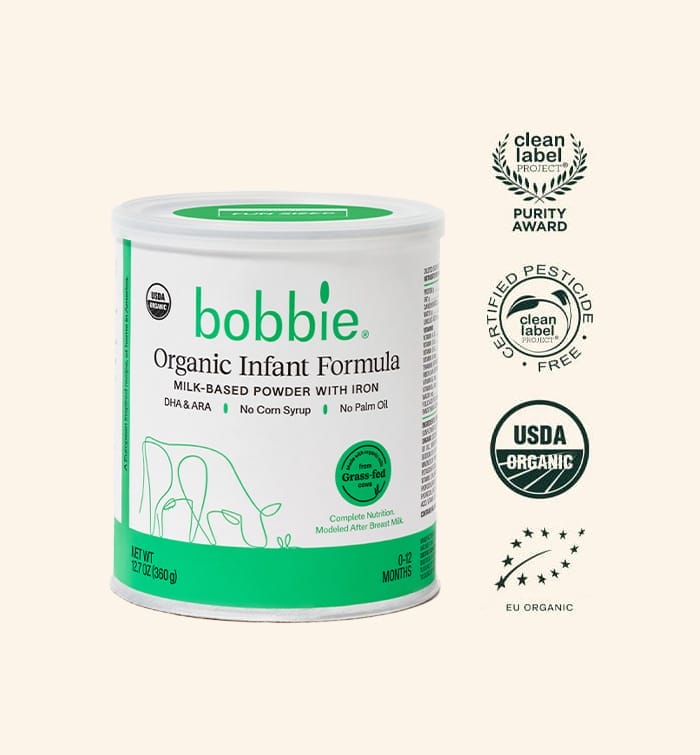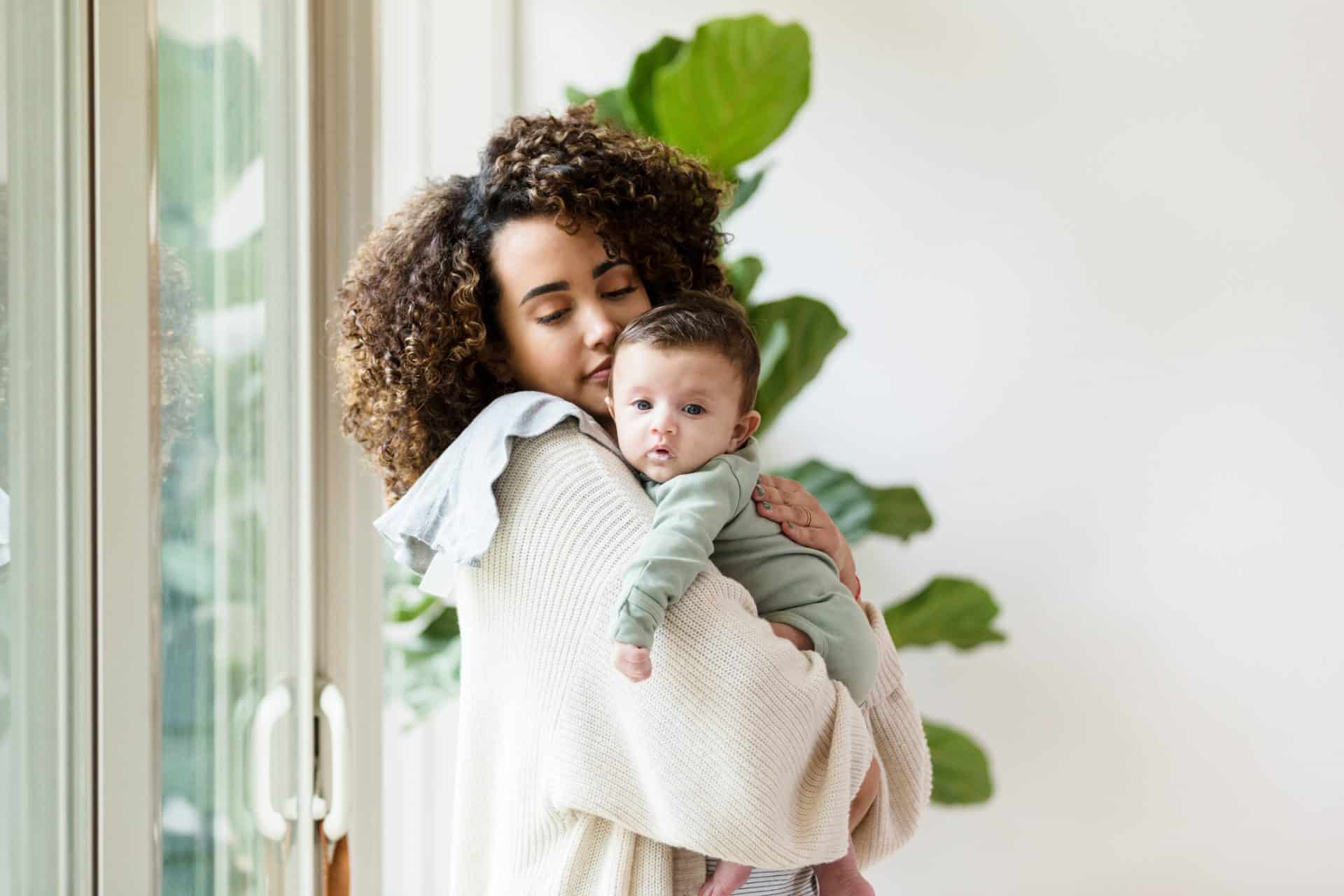We are proud to say that these posts are not sponsored. Our editorial team of Bobbie moms and writers personally select each featured product. If you buy something through our links, we may earn an affiliate commission, at no cost to you.
Wouldn’t it be great if there was a perfect guide for burping your baby? Like a recipe it would read: Add twelve firm pats, plus a smidge of back rubs, and after six and a half minutes you’ll have a perfect burp and a happy baby! While a clear-cut formula doesn’t really exist to spell out when your baby needs to be burped, there are burping tricks that can help you out. We’ve put together a plan that supports you in how to burp, find the best burping position, and when to stop burping your baby.
- When to burp your baby
- When do you stop burping a baby
- How long do you have to burp a baby
- Signs a baby needs to burp
- What if my baby won’t burp after feeding
- Burping methods
- What if burping isn’t effective
- Baby Burping Tricks
- How to burp a baby with reflux
- When can you stop burping a baby with reflux
- When can I stop burping my baby at night?
- At what age do I stop burping my baby completely
When to burp your baby
Amna Husain, MD, FAAP, and Bobbie Medical Advisor, says burping is the most helpful during the first two to three months of your baby’s life. There’s not an exact manual for burping a newborn but there are moments when burping is most effective. For breastfed babies, Dr. Husain suggests burping your little one when switching breasts, and if you’re bottle-feeding your baby, squeeze in (or out) a burping session during the first few ounces of feeding. Dr Amna created a video about burping babies to share her advice and baby burping positions pictures.

Shop Bobbie Organic Infant Formula
Bobbie Organic Infant Formula is a USDA Organic, EU-style infant formula that meets all FDA requirements. It is a complete nutrition milk-based powder modeled after breast milk and is easy on tummies. It is non-GMO and doesn't have corn syrup, palm oil, or maltodextrin. Learn more about Bobbie.
When do you stop burping a baby
There’s no set age to stop burping your baby, but four to six months seems to be the general time frame. “Once your baby is able to move (sit up, rollover) they may not need to be burped,” Dr. Husain begins, “they may even burp themselves as mobilization of air occurs with movement.”
How long do you have to burp a baby
Throughout the first two to three months of your newborn’s life, they’ll need to be burped. Dr. Husain says when your baby is swallowing formula or milk they’re also potentially taking in air. “A baby’s stomach is pretty small in the first couple of days to weeks. When your baby takes in lots of air, it can impact the way they feel. This can cause an uncomfortable feeling of distention in the tummy area and influence how well and how much milk/formula they’re able to drink,” Dr. Husain says. So, in the first days, weeks, and months of your baby’s life burping is super helpful.
When can you stop burping a baby
All babies are different, so their needs will vary. But you can start listening for the soothing sounds of your baby belching all by themselves around the four-month mark.
Signs a baby needs to burp
As your baby grows, you’ll begin to notice signs all your baby’s own that they need to burp. Some babies grow fidgety, move their legs closer to their chest, or even make odd facial expressions. Then there are some signals babies have in common. Dr. Husain suggests looking out for these four universal hints your baby is ready to assume their favorite burping position:
- Crying or fussy
- Not feeding comfortably
- Difficulty latching
- Pulling away from the bottle and/or breast
What if my baby won’t burp after feeding
There’s no reason to force a burp— especially after 10 to 15 minutes of trying, Dr. Husain says. If your baby is having a tough time burping, you can always try different burping positions/methods to see if this change will coax out that additional air.
Burping methods
1. Over the shoulder: This is the most popular method and you start by sitting up and placing your infant on their tummy against your chest. This provides a comfortable “counter-pressure” on your baby’s belly. For a newborn who can’t support their head (or if you have a slightly sleeping baby), let their chin rest on your shoulder— but grab your burp cloth for unexpected spit-ups! For infants who can raise their heads, Dr. Husain suggests placing the baby so their head is over your shoulder. “If your baby spits up a lot, the spit-up will go over your shoulder rather than on your clothes,” she says.
2. Sitting Up: This is Dr. Husain’s preferred position because “it’s easy to do and not so tough on the body.” With your baby sitting upright on your lap, find a good “c-hold” with your hand around their jaw and underneath their ears (this supports a newborn’s head.) Lean your infant forward slightly and to pat your baby, Dr. Husain encourages firm pats (versus gentle patting) higher on the baby’s back for better burping results.
3. Laying on lap: Lay your baby on their stomach across your lap and let the back-patting begin. You can give your baby’s head a little extra support with your free hand if needed. You should know, Dr. Husain says, that this isn’t her favorite position because it can lead to more vomiting and she finds many babies aren’t a fan of this position.
What if burping isn’t effective
There are times when you’ve tried all the burping positions and even sung a few choruses of Bon Jovi’s Livin’ On A Prayer for good measure and still your baby cries loud enough for your neighbors to hear. Dr. Husain reassures us that if your baby is resisting a burp, there are baby burping tricks you can try and it’s good to note breastfed babies require less burping than bottle-fed babies.
Baby Burping Tricks
1. Baby massage: Dr. Husain says baby massage is a way to encourage some big ol’ burps. Baby massage can help calm and soothe your little one.
2. Walk around: Dr. Husain advises to get in your steps with your baby before (or during) burping. “The change of pace and change of scenery allows them to relax,” she says.
3. Feed more: If your baby is still fussy after burping, Dr. Husain suggests feeding your infant a little more so they have a fuller stomach. “I’ve seen this work!” she says.
How to burp a baby with reflux
If your baby has been diagnosed with infant reflux, you’ll notice them spitting up frequently, being cranky after eating, and possibly projectile vomiting. The Mayo Clinic reassures reflux generally isn’t cause for concern— only for investing in many more burp cloths. When burping a baby with reflux, the same rules apply although Dr. Husain suggests burping more frequently.
When can you stop burping a baby with reflux
Babies with reflux also begin to burp on their own as they move into their fourth month, Dr. Husain says.
When can I stop burping my baby at night?
Ending your middle-of-the-night burping sessions can occur around two to three months. Dr. Husain does mention that if you’re dream feeding (a practice where a caregiver/parent wakes baby to feed them when not fully awake) you should know it isn’t always necessary to burp. “Your baby may be more relaxed and take in less air in general during the feed,” Dr. Husain says.
At what age do I stop burping my baby completely
While all babies will grow and develop at their own pace, the general rule is that anywhere from four to six months, your baby will outgrow the need to be burped. Once your baby is able to roll over which is around four months, and then sit up which happens close to six months, your baby will more than likely burp themselves.
Now that you have all the tricks of the burping trade, you can discover which ones work best for your little one–until then don’t forget to stock up on the best burp cloths!

Shop Bobbie Organic Infant Formula
Bobbie Organic Infant Formula is a USDA Organic, EU-style infant formula that meets all FDA requirements. It is a complete nutrition milk-based powder modeled after breast milk and is easy on tummies. It is non-GMO and doesn't have corn syrup, palm oil, or maltodextrin. Learn more about Bobbie.

